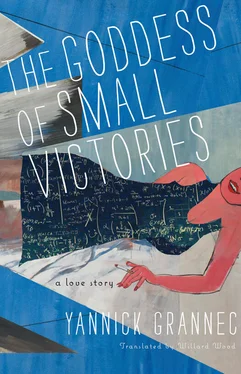“Listen to what this despicable ‘Dr. Austriacus’ has written in the Schönere Zukunft . He hasn’t even got the courage to sign his name to this garbage.”
He read the article from the progovernment Catholic newspaper in a low voice. I leaned in to catch the drift: “The Jew is inherently antimetaphysical. In philosophy, he embraces logicism, mathematicism, formalism, and positivism — characteristics that Schlick possessed in abundance. It is to be hoped that Schlick’s gruesome assassination at the University of Vienna will hasten the discovery of a truly satisfactory solution to the Jewish problem.”
He threw the newspaper into the wastebasket.
“What a rag! This will destroy Kurt.”
That’s how I heard the news: Moritz Schlick had just been killed on the steps of the university by an anti-Semitic student. Schlick, a philosopher and founding member of the Vienna Circle, was more than Kurt’s professor, he was his mentor and friend. How would Kurt take his death, coming so soon after Hahn’s?
“Hans Nelböck, Schlick’s killer, studied mathematics at the same time as my brother, and he also lived on the Lange Gasse.”
I shuddered. I, too, lived on that street.
“They didn’t know each other. But Kurt and I were his neighbors, our paths must have crossed at some point.”
“These madmen are destroying the last remnants of intelligent life in Vienna. The Nazis jumble together positivists, logic, mathematics, and Jews even if the whole thing makes no sense. Kurt is going to have trouble too, I’m certain of it. As soon as he’s on his feet again, I’m going to advise him to leave the city. Morgenstern has told me that he’s putting his affairs in order. He’ll be on the boat soon.”
“Kurt is in no condition to travel, Herr Gödel.”
“None of these people are going to forget him immediately. Their ideas are short, but their memories are long.”
“He’s had very little contact with the university these last months.”
“Nelböck received treatment at a number of psychiatric clinics. One way my brother might react to these events is to see him as his dark doppelgänger. It might be better to say nothing about this for the moment. What do you think, Fräulein Porkert?”
I was not accustomed to giving Rudolf advice. Yet I was becoming a key figure in the mix. If Kurt was finally recovering his health, it was thanks to my ministrations.
“He has his own way of interpreting things, especially those you try to keep from him. And lying always entails more lying.”
“Will you handle it, then?”
I caught sight of Anna crossing the lobby. She signaled discreetly that she was going to the back door for a cigarette. I decided to join her, needing a jolt of friendship to calm my long-suffering nerves. No sooner was he himself again than his family was already planning to send him far away from me. Anna couldn’t persuade his doctor to talk them out of it all by herself, but it was worth a try.
“I’ll do it,” she said. “It’s still too early to send him away.”
We had to keep the terrible news from undermining his recent progress. I had seen a fragile man set off for Princeton and return a shadow of himself. In the months after his journey back from Paris alone, Kurt had stopped eating. He weighed under one hundred pounds, and only my voice was sometimes able to rouse him from lethargy.
I had no training and no official standing, but I listened to the advice of redheaded Anna, and she’d seen plenty of others fall apart. I gave it everything I had: my sense of joy, of beauty. I opened the curtains to let in air and sunlight when the doctors imprisoned him in the dark cage of sleep. I had his gramophone delivered when they were recommending silence. I brought in the first flowers of spring. I spoke to him, without a break, when he was withdrawing further and further into himself. I lied about the state of the world, lied while reading the newspaper, lied about my own happiness. I talked to him about the early-summer fruits that we would eat together, about the lovely light that once again bathed Vienna, about the sounds of children in the Prater, about sweet Anna and her adorable carrot-haired son. I talked to him about the sea, which Anna and her son had never seen any more than we had, and how we would all go see it together. I consoled him, scolded him, blackmailed him the way you would a child. I fed him, spoonful by spoonful. I touched his body, so changed from the body I had desired, with neither pity nor disgust. I listened to his ravings, tasted each of his foods, again and again, to prove that no one was trying to kill him. I kept my counsel about the one thing that was true: that he was poisoning himself.
I accepted his weakness, his self-pity, his entreaties, his disrespect, followed by his anger, which always brought the first words to his lips. Weak as he was, his mental powers suffered, and it weakened him further to see his mind in decline. His mind had been a scalpel, a perfect tool, and he was afraid of its becoming a dull knife. He was a magnificent but ever-so-fragile precision instrument. I cleaned his moving parts as well as I could. But the mechanism still refused to work. Though he was only thirty, he had the soul of an old man. He would say, “Mathematical genius is for the young.” Was he already past the age when insight strikes? That was the real question. He preferred silence to mediocrity. I had no answer to that, and no remedy for it, but having to choose between two poisons, I brought him his notebooks. I cried over it. I hated myself. But I saw no other possibility. I had to supply opium to an addict, to relieve him and intoxicate him at the same time. His doctor, Wagner-Jauregg, did something similar, inoculating his paralytic patients with malaria to rouse them from catalepsy. Evil to banish evil. What would the good doctor not have tried if I hadn’t made the choice I did? Electricity? Perpetual seclusion? I have heard time and again that mathematics leads to madness. If only it were that simple! Mathematics didn’t drive my man to madness — it saved him from himself, and it killed him.
Before going up to his room, I fished the newspaper out of the wastebasket and clipped the theater listings. It would give me something to discuss while I spoon-fed him his pap.
Sitting on his bed, a doctor with graying temples fingered Kurt’s wrist while consulting his watch. He looked me over with open and insulting lubricity. Kurt straightened up. I sat beside my man and waited for the doctor to leave before producing the clipping.
“Your idol has flown, Kurtele. Maria Cebotari is now singing at the Berlin Opera.”
She scratched at the door again; no immediate answer. Adele had responded neither to her contrite letter nor to the expensive gift accompanying it. Anna’s anger had swung from the old woman to herself and back without really finding a target. She should never have trusted her too-sudden intimacy with Adele. She thought back to the maple tree. She had been overconfident; she’d imagined herself becoming indispensable. Unfuckable virgin. The words still stuck in her craw.
“ Kommen Sie rein! ” Come in!
She entered the lavender-scented room on tiptoe. Mrs. Gödel, freshly powdered and perfumed, had spruced herself up. “Anna, I am happy to see you.” A failure of memory was unlikely; she had apparently decided to act as though nothing had happened. “Dear child, I recognized your timid little knock. Now, as you like to poke your nose into other people’s business, I’ve prepared a few crumbs for you.”
The young woman squared her shoulders; Adele hadn’t forgotten everything. A truce was acceptable. She slid her coat off while Adele opened a translucent envelope with careful gestures. “Where did I put my glasses?” Anna brought them to her docilely. Adele patted the blanket. “Come sit next to me. These are some mementos I set aside before I was moved here.” Anna felt her resentment melt away as she looked at the first photograph: an old-fashioned snapshot of two little boys posing, the younger of whom was Kurt. Rudolf was holding a hoop; Kurt carried a doll. Still a toddler, he wore a shift.
Читать дальше












